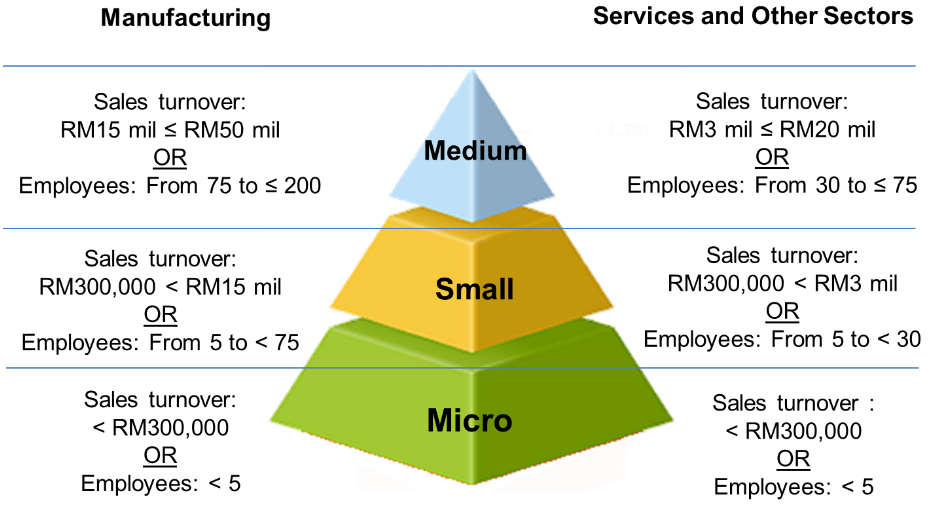Introduction
Artificial Intelligence (AI) represents a pivotal technological advancement capable of autonomously analysing environments and executing actions to achieve specific objectives.[1] Essentially, AI refers to the technology that enables machines to perform tasks that would normally require human intelligence. Among the myriad tasks that can be performed by AI, its ability to assist businesses manage their compliance risks holds significant value. With AI, it is revolutionary how diverse businesses can navigate through regulatory complexities and mitigate compliance risks.
This capability is particularly crucial for micro, small and medium enterprises (MSMEs), which often face resource constraints to adhere to compliance requirements. MSMEs which constitute a significant portion of Malaysia’s economy, comprising 38.4% of the Gross Domestic Product (GDP) and 48.2% of total employment in 2022,[2] are categorized based on their annual sales turnover and the number of employees, as shown below:

Diagram 1: Definition of MSME.[3]
All MSMEs must be entities registered with the Companies Commission of Malaysia (SSM) or other equivalent bodies which does not include entities that are public-listed on the main board and subsidiaries of public listed companies on the main board, multinational corporations (MNCs), government-linked companies (GLCs), Syarikat Menteri Kewangan Diperbadankan (MKDs), and state-owned enterprises.
The Government through Ekonomi MADANI Framework encourages MSMEs to increase their level of competitiveness through the transition of business models via automation and digitalisation. The initiatives outlined in Budget 2024, aimed at promoting technology adoption and digitalization among MSMEs,[4] are designed to bolster competitiveness not just among the MSMEs themselves but also to prepare them to compete on a global scale. The initiatives are as follows:
| Initiatives by the Government | Details |
|---|---|
| Digitalization Grants | RM100 million for over 20,000 MSMEs to upgrade sales systems, inventory management, and digital accounting. |
| Loan Fund for Automation and Digitization | RM900 million loan fund under Bank Negara Malaysia (BNM) to boost SME productivity through automation and digitization. |
Table 1: Initiatives by the Government in strengthening competitiveness of MSMEs
In respect of MSMEs embracing technology adoption, it is crucial to recognize that this shall be the stepping stone for MSMEs to integrate advanced technology such as AI to enhance compliance efforts. It is predicted by the end of 2024, Malaysia will establish a set of AI governance and code of ethics to enable business entities to benefit from this high potential technology.[5] AI offers MSMEs sophisticated tools to navigate regulatory complexities efficiently. This strategic use of AI not only enhances operational efficiency but also reinforces regulatory compliance, which has conventionally been regarded as a checklist task rather than a key driver for growth.
Globally, AI’s impact on economic productivity is projected to be $15.7 trillion by 2030.[6] This growth trajectory sets the stage for Industry 5.0, where AI is visioned to integrate with sustainability and human-centred principles, fundamentally reshaping business strategies and operational frameworks.[7]
Compliance Risks for MSMEs
MSMEs in Malaysia operate within a complex regulatory landscape governed by a myriad of acts and regulations, creating a challenging web of compliance obligations. Navigating these obligations across diverse categories demands considerable time, effort and financial resources which can be particularly taxing for MSMEs. According to a 2022 report by the Sustainable Finance Institute Asia, non-compliance with ESG regulations could result in Malaysian small, medium enterprises (SMEs) losing up to RM292 billion in revenue.[8] The following are some examples of compliance risks faced by MSMEs:-
1. Employment Law and Statutory Contributions Obligations
The compliance risks face by MSMEs include ensuring adherence to the Employment Act 1955, which covers among others, regulations on wages, working hours, employee benefits, and termination procedures. Additionally, MSMEs must ensure timely contributions to Employee’s Provident Fund (EPF) and compliance with other statutory requirements such as Social Security Organization (SOCSO) and Employment Insurance System (EIS). In the first quarter of 2023 alone, a total number of 13,764 employers were reported to have failed to pay EPF contributions, highlighting the significant challenges MSMEs face in meeting these regulatory obligations.[9]
2. Accounting and Financial Management
Securing approval for loans and microfinancing can be very challenging, as most lenders and financial institutions rigorously examine a business’s records. This poses a significant problem for MSMEs, as their inadequate and incomplete recordkeeping practices often prevent them from successfully applying for funding. Simultaneously, MSMEs struggle with tax compliance, further complicating their financial management and overall business operations.
3. Prevention of Data Breaches
One of the most significant risks faced by MSMEs is data breaches. Unauthorized access to sensitive data, whether customer information or proprietary data, can lead to severe financial and reputational damage. Compliance entails adhering to data protection laws such as Malaysia’s Personal Data Protection Act (PDPA), which mandates measures to protect personal data from unauthorized access and disclosure. Large corporations and governmental organizations have fallen victim to recurring data breaches, underscoring the vulnerability that MSMEs face as they establish themselves.
4. Protection of Intellectual Property (IP) Rights
Malaysia is still behind in emerging as an IP-conscious society, facing several challenges related to IP creation, protection, management, and exploitation. Registering and safeguarding IP rights with the Intellectual Property Corporation of Malaysia (MyIPO) entails managing several compliance risks. MSMEs must also ensure accurate and timely submission of paperwork, forms and fees to MyIPO for registration as well as regular renewal of IP registrations is crucial to maintain protection. Effectively addressing these compliance risks enables MSMEs to safeguard their intellectual property assets and mitigate potential legal and financial risks.
5. Anti-Money Laundering (AML) and Fraud Prevention
Another common compliance risks are money laundering and fraud risks which have been a long history struggle suffered by any companies, especially to those newcomers in the financial industry such MSMEs as these risks stem from the complex regulatory environment they operate in, which includes stringent requirements aimed at preventing financial crimes, ensuring fair practices, and protecting consumer interests.
With only basic and minimal AML prevention measures in place due to the financial constraint, it is challenging for MSMEs to detect suspicious transactions that could lead to money laundering. At the same time, as fraudsters exploit the vulnerability of the system, it is almost impossible for MSMEs to tackle fraud by only depending on traditional methods due to its inadequacy to compete with fraudsters’ sophisticated and illicit schemes. Hence, effective AML and fraud prevention are crucial for safeguarding the financial integrity of MSMEs, ensuring they comply with the strict regulatory standards.
Leveraging AI to Manage Compliance Risks for MSMEs
The staggering potential losses highlighted above, substantiate the critical need for MSMEs to prioritize compliance and leverage advanced technologies like AI to mitigate these risks. AI can improve regulatory compliance for MSMEs in Malaysia by offering a range of valuable benefits and solutions such as the following:
1. Automating Compliance Processes
Compliance automation may consist of analysing data in risk assessments and provide real-time automated alerts to new regulations, ensuring MSMEs are always up to date on their compliance status. AI can assist MSMEs to automatically generate compliance reports based on the monitored data.
For instance, AI can oversee payroll processes for MSMEs in Malaysia, ensuring compliance with both local employment laws and cross-border regulations like Environmental, Social, and Governance (ESG) standards. This includes ensuring employees receive their salaries and statutory contributions correctly and on time. Beyond payroll, AI also can ensure tax compliance is met by MSMEs. For instance, QuickBooks, an AI tool offers accounting software tailored for small businesses, featuring robust tax compliance functionalities. The integration with other financial tools simplifies tax management for MSMEs, enhancing efficiency and accuracy in handling tax obligations.
By automating processes to oversee compliance, potential oversights or human errors that could lead to breaches of compliance are minimized. This proactive approach not only strengthens regulatory adherence but also improves operational efficiency, particularly beneficial for MSMEs that may not have dedicated compliance officers. It reduces risks associated with non-compliance, ensuring that businesses can operate smoothly within regulatory frameworks. Moreover, by automating compliance tasks, MSMEs can redirect resources towards core business activities, thereby supporting sustainable growth in a complex regulatory environment.
2. Enhancing Risk Management
By using historical data, AI uses machine learning algorithms to predict future risks and trends. This allows MSMEs to anticipate potential issues and take proactive measures to address them, such as implementing corrective actions or adjusting its internal policies. While MSMEs might lack specialized IT departments or the necessary qualifications to manage IT risks, AI tools provide a viable solution. By leveraging AI-driven cybersecurity solutions, MSMEs can automate threat detection and response, simplify IT compliance, and protect their operations from potential cyber threats. AI tools like Darktrace and CrowdStrike Falcon can automatically detect and respond to cyber threats, reducing the burden on MSMEs to manually monitor and manage these risks. This automation is crucial for businesses without specialized IT departments, as it ensures continuous protection without requiring constant oversight.
Many MSMEs thrive or establish their market presence through their own innovation, making the protection of IP a core aspect of their business strategy. AI can significantly aid MSMEs in reducing compliance IP risks through several mechanisms. For example, TrademarkNow is a notable AI-driven platform that aids in trademark research, clearance, and monitoring. This reduces the risk of unintentional infringement and ensures that new trademarks comply with existing IP laws and regulations. There is also PatSnap which combines AI with big data analytics to provide comprehensive insights into intellectual property trends, competitor activities, and patent landscapes. MSMEs can use PatSnap to analyse patent data, identify potential infringement risks, and make informed IP decisions. By addressing the importance of IP in this competitive landscape and identifying potential conflicts early, MSMEs can mitigate the potential costs associated with IP disputes.
3. Strengthen Due Diligence Process
MSMEs in the financial sector must perform thorough and detailed assessment of the customer’s risk profile which is known as enhanced due diligence (EDD) to comply with Anti-Money Laundering (AML) and Counter-Terrorist Financing (CTF) regulations. AI-powered platform can analyse vast amounts of data related to customers and vendors, including financial records, credit histories, legal statuses, and compliance with specific regulatory standards before engaging in any business transactions. MSMEs also can be made aware of past legal issues or compliance breaches by the customers or vendors that may pose risks to the MSMEs. With AI, it can streamline the customer onboarding process by automating identity verification and background checks. This includes analyzing vast amounts of data to verify identities as well as inspection for politically exposed persons (PEPs), and identification of any adverse media mentions.
AI also can assign risk scores to customers based on their profiles and transactional behaviours. This allows MSMEs to prioritize high-risk customers for further scrutiny and ensure compliance with regulatory requirements. AI can continuously monitor customer transactions and behaviours for any suspicious activity. This real-time monitoring helps in identifying and mitigating risks promptly.
4. Enhancing Money Laundering and Fraud Detection
Integrating AI-driven tools in money laundering and fraud prevention allows effective monitoring of financial transactions for irregularities such as unusually large transactions, odd timing of transactions, or patterns differs from typical behaviour. This helps MSMEs detect potential fraud, money laundering, or other financial irregularities promptly.
Moreover, AI-driven tools provide continuous monitoring of financial transactions and processes in real-time. For instance, AI platforms like Darktrace and IBM Trusteer can analyze vast amounts of transactional data, applying machine learning algorithms to detect suspicious patterns indicative of money laundering, fraud and other financial crimes. This proactive supervision enables immediate detection of suspicious activities, allowing MSMEs to respond swiftly to potential money laundering and fraud incidents before significant losses occur.
This technological advancement not only improves money laundering and fraud detection accuracy but also strengthens overall financial security, crucial for the sustained growth and reputation of MSMEs in today’s competitive landscape.
Conclusion
The potential of AI has been widely recognized for enhancing productivity, as evidenced by the widespread use of tools like ChatGPT, Siri and Alexa. For MSMEs, embracing AI for compliance isn’t just about leveraging technology; it’s about ensuring long-term viability and growth in the digital era. While the initial investment in AI adoption may appear daunting, the long-term return is well worth the effort. Once Malaysia establishes the necessary regulations to adopt AI and given the government’s initiatives to promote technology adoption, MSMEs should seize this opportunity to leverage AI and ensure robust compliance practices, putting no business at stake.
If you have any questions or queries, please contact our Partner, Mr. Fakhrul Fadzilah (fakhrul@nzchambers.com) or Associate Ms. Husna Shariff.
Authors:
- Fakhrul Fadzilah
- Nurul Husna Shariff
[1] A Definition of AI: Main Capabilities and Scientific Disciplines by The European Commission’s High-Level Expert on Artificial Intelligence https://ec.europa.eu/futurium/en/system/files/ged/ai_hleg_definition_of_ai _18_december_1.pdf
[2] Catalysing MSME and MTC Access to the Capital Market: 5-Year Roadmap (2024–2028) https://www.sc.com.my/api/documentms/download.ashx?id=e9b390ba-f259-4afc-99d6-08b20cf6cf00
[3] Catalysing MSME and MTC Access to the Capital Market: 5-Year Roadmap (2024–2028) https://www.sc.com.my/api/documentms/download.ashx?id=e9b390ba-f259-4afc-99d6-08b20cf6cf00
[4] Belanjawan 2024 Speech https://belanjawan.mof.gov.my/pdf/belanjawan2024/ucapan/ub24-BI.pdf
[5] Malaysia coming up with AI governance and code of ethics by NST on 9 January 2024: https://www.nst.com.my/business/corporate/2024/01/998905/malaysia-coming-ai-governance-and-code-ethics
[6] PwC’s Global Artificial Intelligence Study: Exploiting the AI Revolution: https://www.pwc.com/gx/en/issues/data-and-analytics/publications/artificial-intelligence-study.html#:~:text=Total%20economic%20impact%20of%20AI%20in%20the%20period%20to%202030&text=AI%20could%20contribute%20up%20to,come%20from%20consumption%2Dside%20effects
[7] From Industry 4.0 Digital Manufacturing to Industry 5.0 Digital Society: A Roadmap Toward Human-Centric, Sustainable, and Resilient Production https://link.springer.com/content/pdf/10.1007/s10796-024-10476-z.pdf
[8] Sustainable Finance Institute Asia 2022 report findings quoted in FMT news article 5 September 2022 https://www.freemalaysiatoday.com/category/highlight/2022/09/05/green-transition-a-quantum-leap-for-smes/
[9] Take action against employers who flout EPF rules by NST news article 10 January 2024 https://www.nst.com.my/opinion/letters/2024/01/999273/take-action-against-employers-who-flout-epf-rules







